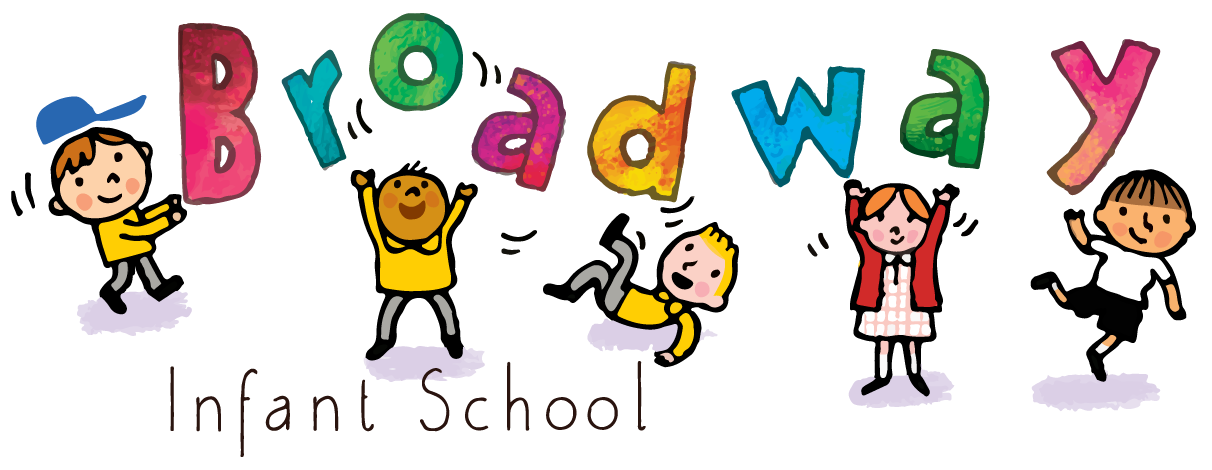Keeping Children Safe
Safeguarding and Child Protection
The Governors and staff of Broadway Infant School take seriously their responsibility to promote the safeguarding and welfare of all children entrusted to our care.
As a school our first priority is the safeguarding of our pupils.
Miss Tumelty is our Designated Safeguarding Lead, Mrs Titley is one of our Deputy Designated Safeguarding Leads and Mrs Clark is our second Deputy Designated Safeguarding Lead.
Safeguarding arrangements at Broadway Infant School are underpinned by three key principles:
Safeguarding is everyone’s responsibility: all Staff, Governors and Volunteers should play their full part in keeping children safe.
That Broadway Infant School operates a child-centred approach: a clear understanding of the needs, wishes, views and voices of children.
That all Staff, Governors and Volunteers have a clear understanding regarding abuse and neglect in all forms; including how to identify, respond and report. This also includes knowledge in the process for allegations against professionals. Staff, Governors and Volunteers should feel confident that they can report all matters of safeguarding children in the School where the information will be dealt with swiftly and securely, following the correct procedures with the safety and wellbeing of the children in mind at all times.
Our named Governor for Safeguarding is Mrs Carol Warrant.
Definitions
Safeguarding and Promoting the Welfare of Children
Protecting children from maltreatment.
Preventing impairment of children’s health or development.
Ensuring that children are growing up in circumstances consistent with the provision of safe and effective care.
Taking action to enable all children to have the best outcomes.
Child Protection
The activity that is undertaken to protect specific children who are suffering, or are likely to suffer, significant harm.
We have comprehensive policies, procedures and an ongoing training programme to ensure that all staff are aware of their roles and responsibilities to support and protect all our children.
Parent/Carer Role
Safeguarding is everyone’s concern. If you have a concern regarding the safety or welfare of a child then share your concern.
If you are worried about a child please come and speak to Miss Tumelty (Designated Safeguarding Lead), Mrs Titley (Deputy Designated Safeguarding Lead) and Mrs Vicky Clark (Deputy Designated Safeguarding Lead).
If you would like more information on Keeping Children Safe at home please see this useful checklist.
Anti-Bullying
It is important that children feel emotionally safe in school. Part of the school’s PSHE provision is to take part in anti-bullying week each year. If as a parent you feel that you need more advice on this subject or have any concerns please talk to your child’s teacher or the Headteacher.
Our school Anti-Bullying Policy and Child Friendly Anti-Bullying Policy can be found on our policies page.
There are also several useful websites:
https://www.nspcc.org.uk/what-is-child-abuse/types-of-abuse/bullying-and-cyberbullying/
http://www.bullying.co.uk/advice-for-parents/
https://www.anti-bullyingalliance.org.uk/tools-information/advice-parents
https://www.kidscape.org.uk/advice/advice-for-parents-and-carers/
Online Safety
With technology updating so quickly, it is fantastic that we now have the world at our fingertips and can learn in new and engaging ways. However, we have to make sure we are using new technology safely and appropriately and that our children are aware of the dangers of chatting online or sharing personal information. As part of our PSHE curriculum, we have had lots of discussion about using the internet safely and we felt that the children all responded well to it.
Online-Safety lessons are taught to all pupils each year explaining and demonstrating how to stay safe and behave appropriately online.
We have extensive security measures in place in school, which are monitored both internally and externally, to help safeguard pupils from potential dangers or unsuitable material. Any Online-Safety incidents are recorded and managed in accordance with our E-Safety Policy.
Please come into school if you have any concerns at all and we’d be happy to help where we can.
Top Tips
Always ask a grown up before you use the internet. They can help you find the best thing to do.
Don’t tell strangers where you live, your phone number or where you go to school. Only your friends and family need to know that.
Don’t send pictures to people you don’t know. You don’t want strangers looking at photos of you, your friends or your family.
Tell a grown up if you feel scared or unhappy about anything.
You can also call ‘Childline’ on: 08001111 to talk to someone who can help.
Online safety resources and websites:
There is a safer search engine (just like Google but heavily restricted) which is recommended by CEOP called Swiggle – please use this with your children at home for research. We are planning on using this in school, so the children will soon be familiar with it. http://www.swiggle.org.uk
For younger children, there is a story called ‘Smartie the Penguin‘ which raises issues in a way that young children can relate to.
Resources available for older KS1 children ‘Hector’s World’ – a series of cartoons about online safety and sharing ‘personal information’. You can access the videos here: http://www.thinkuknow.co.uk/5_7/hectorsworld
And some interactive activities here: www.hectorsworld.com/island/index.html
Safer Internet Centre – https://www.saferinternet.org.uk/advice-centre/parents-and-carers
